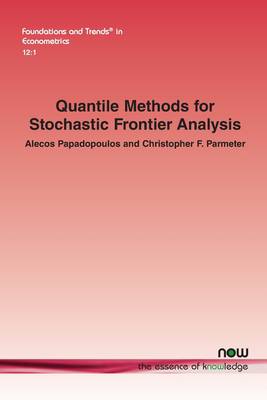
- Afhalen na 1 uur in een winkel met voorraad
- Gratis thuislevering in België vanaf € 30
- Ruim aanbod met 7 miljoen producten
- Afhalen na 1 uur in een winkel met voorraad
- Gratis thuislevering in België vanaf € 30
- Ruim aanbod met 7 miljoen producten
Zoeken
€ 128,95
+ 257 punten
Omschrijving
Quantile Methods for Stochastic Frontier Analysis seeks to merge two seemingly disparate econometric fields, quantile estimation and stochastic frontier analysis (SFA). Why might these two fields be viewed as disparate? Quantiles exist on a continuum of the distribution; the frontier is a fixed object of it. As will be seen, these two approaches can, when used properly, be merged to provide a unified approach to studying a stochastic boundary. Sections 1 to 5 present the current state of affairs. Section 1 details the very close link between the regression function and the conditional quantile function, in order to show that the quantile relation is not some disconnected statistical aspect that lives independently of our regression specification. This section also shows what the quantile approach and the Q-estimator actually do, and we contrast this with what SFA models want to do, using also a simulated example. Section 2 presents the main characteristics and properties of the linear Q-estimator when the error term is independent of the regressors, as a necessary preparation to move to Section 3, where the authors show how some of these properties are fundamentally incompatible with the goals and purposes of SFA. Section 4 discusses recent advances that properly construct the deterministic frontier. Section 5 moves away from quantile regression and presents likelihood-based approaches that use density functions that include as one of their parameters the probability of the zero-quantile of their distributions. Sections 6 to 9 present a new estimator, but also metrics and insights that allow to fruitfully use the quantile approach in SFA. Section 6 shows how one can use the Qestimator together with additional assumptions in order to provide conceptually valid and useful estimation and inference results in SFMs. Section 7 presents quantile-dependent measures of efficiency both at the sample level, and at the individual level, but also how the conditional quantiles of the distribution of inefficiency can be used to offer a picture of how individual efficiency scores are distributed around a chosen quantile of the efficiency distribution. Section 8 proves a fundamental result: that positive and high values of the composite error term of production SFA models, are expected to co-exist with low inefficiency, in a concrete probabilistic sense. Section 9 examines the case of dependence between the error term and the regressors or other covariates. Section 10 provides an empirical illustration that showcases the approach of the four previous Sections, and functions as a guide for detailed applied studies. Section 11 includes a list of the various open issues as well as ideas and directions for future research, while Section 12 offers a short summary and conclusions.
Specificaties
Betrokkenen
- Auteur(s):
- Uitgeverij:
Inhoud
- Aantal bladzijden:
- 140
- Taal:
- Engels
- Reeks:
Eigenschappen
- Productcode (EAN):
- 9781638280941
- Verschijningsdatum:
- 7/11/2022
- Uitvoering:
- Paperback
- Formaat:
- Trade paperback (VS)
- Afmetingen:
- 156 mm x 234 mm
- Gewicht:
- 208 g

Alleen bij Standaard Boekhandel
+ 257 punten op je klantenkaart van Standaard Boekhandel
Beoordelingen
We publiceren alleen reviews die voldoen aan de voorwaarden voor reviews. Bekijk onze voorwaarden voor reviews.











